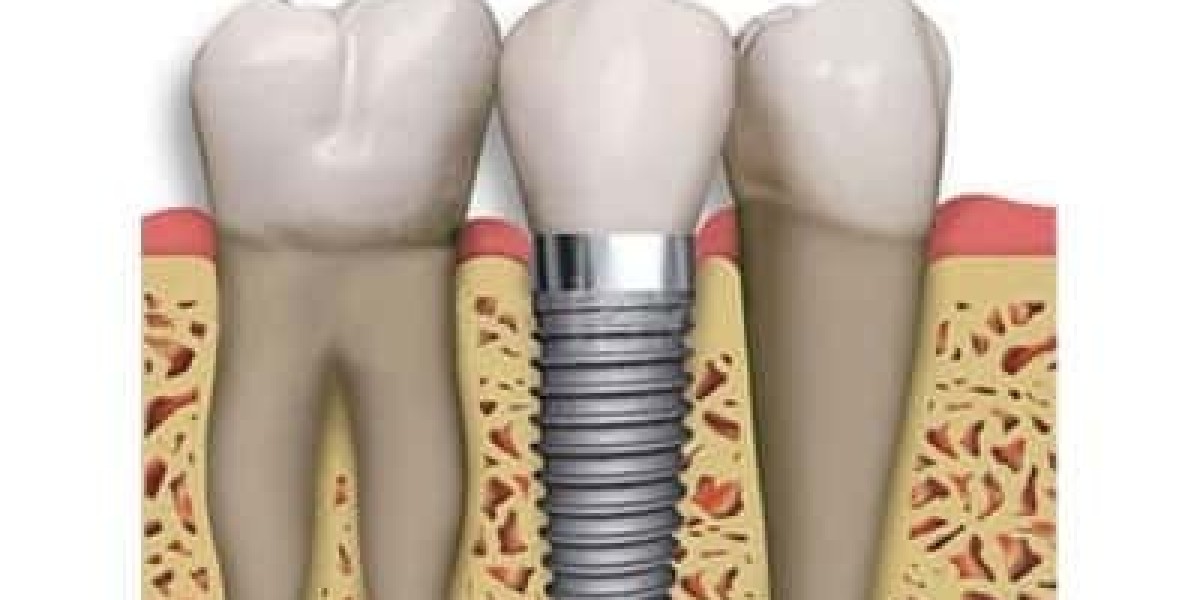They not only restore the functionality of the mouth but also improve aesthetics and boost self-confidence. This article will provide an in-depth overview of dental implants, including the types available, the procedure, benefits, potential risks, and aftercare.
What are Dental Implants?
Dental implants are artificial tooth roots, usually made of titanium, that are surgically placed into the jawbone. They serve as a stable foundation for replacement teeth, which can be in the form of crowns, bridges, or dentures. Unlike dentures, which can be removed, dental implants are designed to be a permanent solution.
Types of Dental Implants
Endosteal Implants:
These are the most common type of dental implants, inserted directly into the jawbone. Endosteal implants can hold one or more prosthetic teeth and are typically shaped like screws, cylinders, or plates.
Subperiosteal Implants:
These implants are placed under the gum but above the jawbone. Subperiosteal implants are generally recommended for patients with insufficient bone height and who cannot undergo bone augmentation procedures. They consist of a metal frame that holds the prosthetic teeth.
Zygomatic Implants:
Zygomatic implants are a specialized type of implant used for patients with significant bone loss in the upper jaw. They are anchored in the zygomatic bone (cheekbone) instead of the jawbone.
Mini Implants:
Mini implants are smaller than standard implants and are often used in less invasive procedures. They can serve as a foundation for smaller dental appliances and are sometimes used for stabilizing dentures.
The Dental Implant Procedure
The dental implant procedure is typically completed in several stages and can take several months. Here’s a step-by-step breakdown of the process:
Initial Consultation
The first step involves a comprehensive consultation with your dentist or oral surgeon. During this appointment, they will evaluate your dental and medical history, perform a physical examination, and take X-rays or 3D images of your jaw. This information will help determine if you are a suitable candidate for dental implants.
Treatment Planning
Once your suitability for implants is confirmed, the dentist will develop a customized treatment plan tailored to your specific needs. This plan will outline the type of implant, the number of implants needed, and any additional procedures required, such as bone grafting.
Bone Grafting (if necessary)
If you have insufficient bone density in your jaw, your dentist may recommend a bone grafting procedure before the implants can be placed. Bone grafting involves adding bone material to your jawbone, allowing it to heal and integrate with your natural bone, creating a stable base for the implants.
Implant Placement
During the implant placement procedure, the dentist will administer local anesthesia to numb the area. They will then make a small incision in your gum to expose the bone and carefully drill a hole where the implant will be placed. The implant is then inserted into the hole, and the gum tissue is stitched closed around it. This procedure typically takes about one to two hours.
Osseointegration
After the implant is placed, a healing period of several months is necessary for osseointegration to occur. During this time, the implant fuses with the jawbone, creating a strong foundation for the artificial tooth. This process usually takes about three to six months.
Abutment Placement
Once osseointegration is complete, a minor surgical procedure is performed to place the abutment. The abutment is a small connector that sits on top of the implant and holds the replacement tooth. The dentist will make another small incision in the gum to expose the implant, attach the abutment, and then close the incision.
Crown Placement
After the gum tissue has healed around the abutment (usually a couple of weeks), the final step involves placing the custom-made crown. Your dentist will take impressions of your mouth to create a crown that matches the color and shape of your natural teeth. Once the crown is ready, it is securely attached to the abutment, completing the dental implant process.
Benefits of Dental Implants
Dental implants offer numerous advantages over traditional tooth replacement options such as bridges and dentures. Here are some key benefits:
Improved Aesthetics
Dental implants look and feel like natural teeth, enhancing your smile and overall appearance. They can restore confidence and improve self-esteem.
Enhanced Functionality
Implants function like natural teeth, allowing you to eat, speak, and engage in daily activities without discomfort or limitations. You can enjoy your favorite foods without worrying about slipping dentures or food restrictions.
Durability
With proper care, dental implants can last a lifetime. They are made from highly durable materials that resist wear and tear.
Bone Preservation
Dental implants help maintain jawbone health by stimulating bone growth. When a tooth is lost, the jawbone can begin to deteriorate over time. Implants replace the tooth root, preventing bone loss.
No Impact on Adjacent Teeth
Unlike bridges, which require altering neighboring teeth, implants do not affect adjacent teeth. This preserves the integrity of your natural teeth.
Easy Maintenance
Caring for dental implants is similar to caring for natural teeth. Regular brushing, flossing, and routine dental check-ups are all that’s needed to keep them in good condition.
Risks and Considerations
While dental implants are generally safe and effective, there are some risks and considerations to keep in mind:
Surgical Risks
As with any surgical procedure, dental implant surgery carries risks, including infection, bleeding, and nerve damage. Choosing an experienced oral surgeon can help mitigate these risks.
Bone Loss
If the jawbone is not dense enough to support an implant, additional procedures (such as bone grafting) may be required. Not all patients are good candidates for implants, so a thorough evaluation is necessary.
Implant Failure
Though rare, dental implants can fail. This may occur due to insufficient bone integration, infection, or excessive stress on the implant. Proper aftercare and adherence to your dentist’s instructions can reduce the risk of failure.
Cost
Dental implants can be more expensive than other tooth replacement options. However, considering their longevity and benefits, many find them to be a worthwhile investment in their oral health.
Aftercare for Dental Implants
Proper aftercare is essential for the longevity and success of your dental implants. Here are some key aftercare tips:
Maintain Good Oral Hygiene
Brush your teeth at least twice a day and floss daily. Use a soft-bristled toothbrush and non-abrasive toothpaste to avoid damaging the implant and surrounding gums.
Regular Dental Check-ups
Schedule regular dental visits for professional cleanings and check-ups. Your dentist will monitor the condition of your implants and overall oral health.
Avoid Hard or Sticky Foods
In the initial weeks following surgery, avoid hard or sticky foods that could dislodge the implant or cause discomfort. Stick to a soft diet until your dentist gives you the go-ahead.
Quit Smoking
If you smoke, consider quitting. Smoking can impair healing and increase the risk of implant failure. Discuss strategies for quitting with your healthcare provider.
Address Any Issues Promptly
If you experience any pain, swelling, or unusual symptoms around the implant site, contact your dentist immediately. Prompt attention can help prevent complications.
Cost of Dental Implants
The cost of dental implants can vary widely based on several factors, including:
Location: Dental implant prices can differ significantly depending on the geographic region and the cost of living in that area.
Complexity of the Case: The extent of treatment required (e.g., bone grafting, number of implants) will influence the overall cost.
Type of Implant: Different types of implants may have varying costs based on materials and technology used.
Dentist’s Expertise: More experienced oral surgeons or dentists may charge higher fees.
On average, the cost of a single dental implant can range from £1,500 to £3,000 in the UK, while full mouth restoration can reach up to £30,000 or more. Many dental clinics offer financing options or payment plans to help manage costs.
Choosing the Right Dental Implant Provider
Selecting the right dental implant provider is crucial for the success of your procedure. Here are some factors to consider:
Qualifications and Experience
Look for a dentist or oral surgeon who specializes in dental implants and has a proven track record of successful cases. Check their credentials and ask about their experience with implant surgeries.
Reviews and Recommendations
Read patient reviews and testimonials to gauge the quality of care provided by the clinic. Personal recommendations from family and friends can also be valuable.
Technology and Facilities
Ensure that the dental practice is equipped with modern technology and follows best practices for sterilization and patient care.
Comprehensive Consultation
Choose a provider that offers a thorough consultation process. This will ensure that your specific needs are assessed, and a personalized treatment plan is developed.
Aftercare Support
Inquire about the aftercare support offered by the clinic. A good provider will have a solid plan for monitoring your recovery and addressing any issues that may arise.
Conclusion
Dental implants offer a transformative solution for individuals with missing teeth, combining functionality with aesthetics. They can significantly enhance your quality of life, allowing you to eat, speak, and smile with confidence. While the procedure involves multiple steps and considerations, the long-term benefits often outweigh the initial investment.
If you are considering dental implants, consult with an experienced dental professional to explore your options. With proper care and maintenance, dental implants can last a lifetime, making them a worthwhile investment in your oral health and overall well-being. Whether you are missing one tooth or several, dental implants could be the key to restoring your smile and improving your life!



